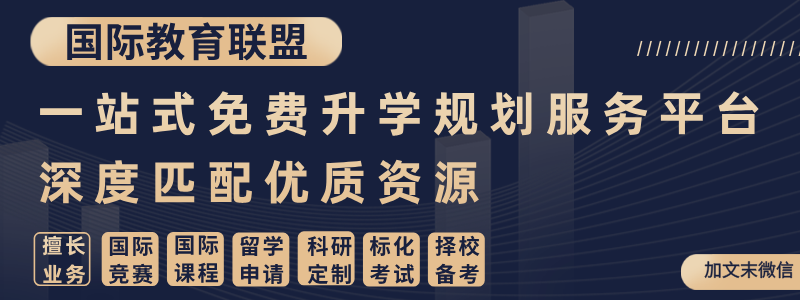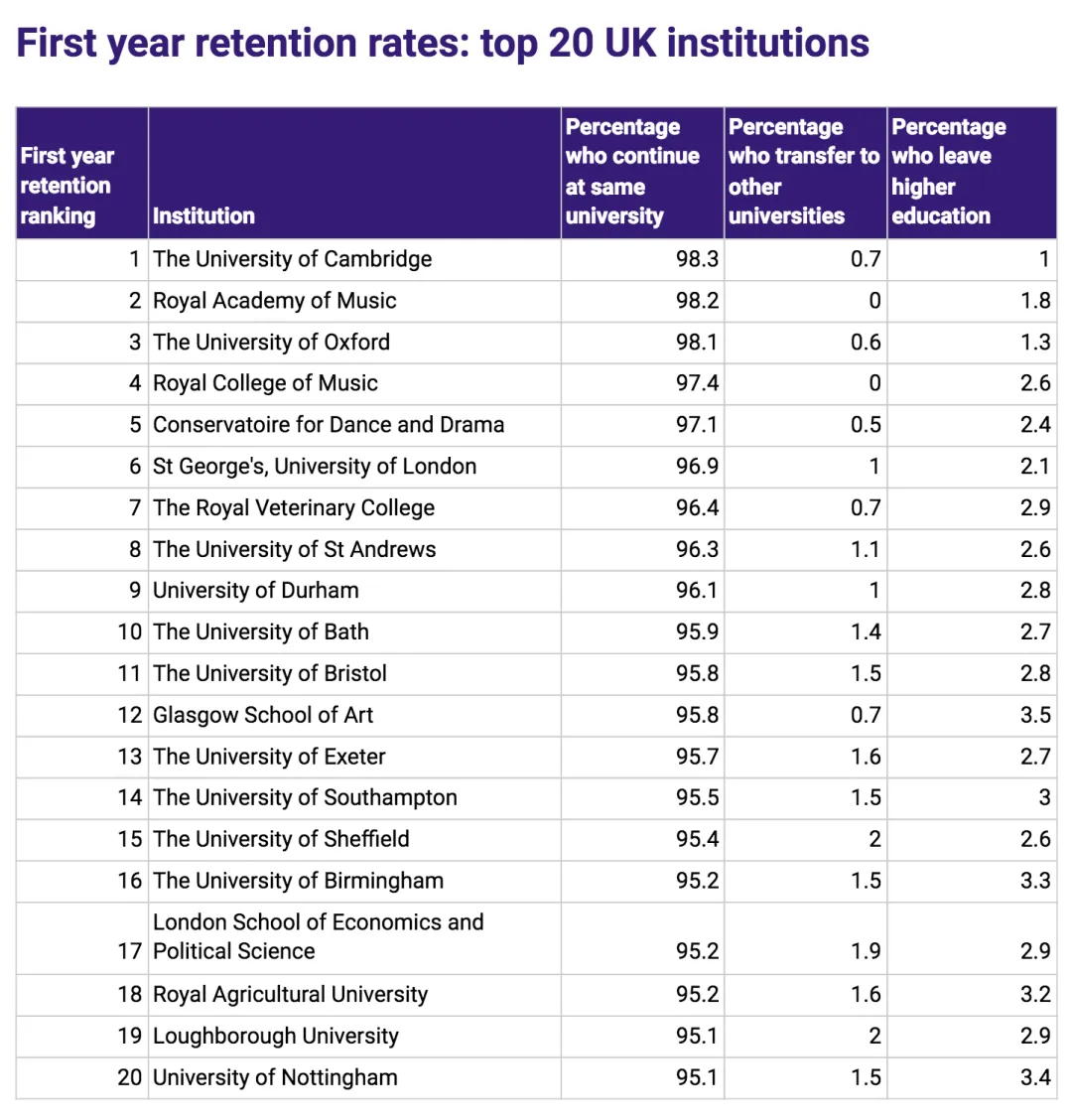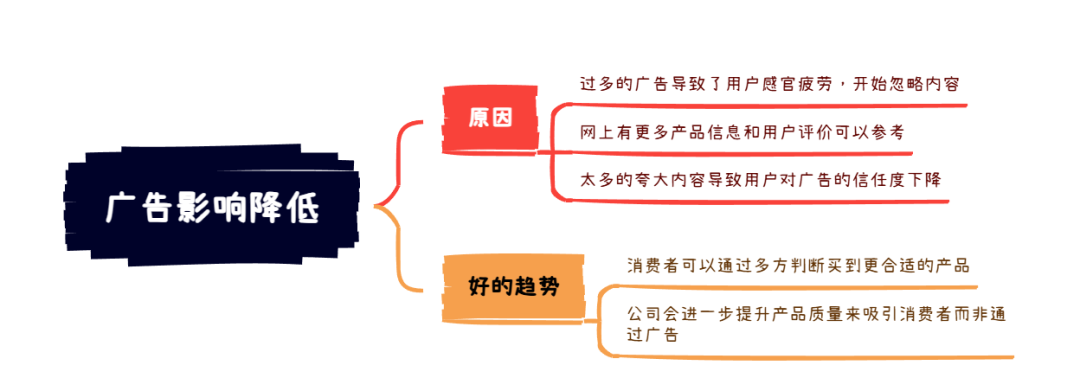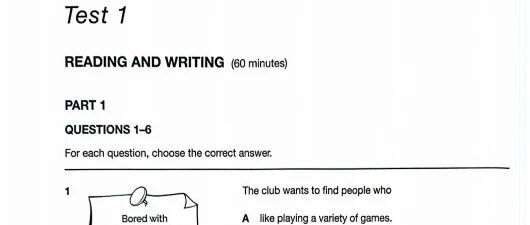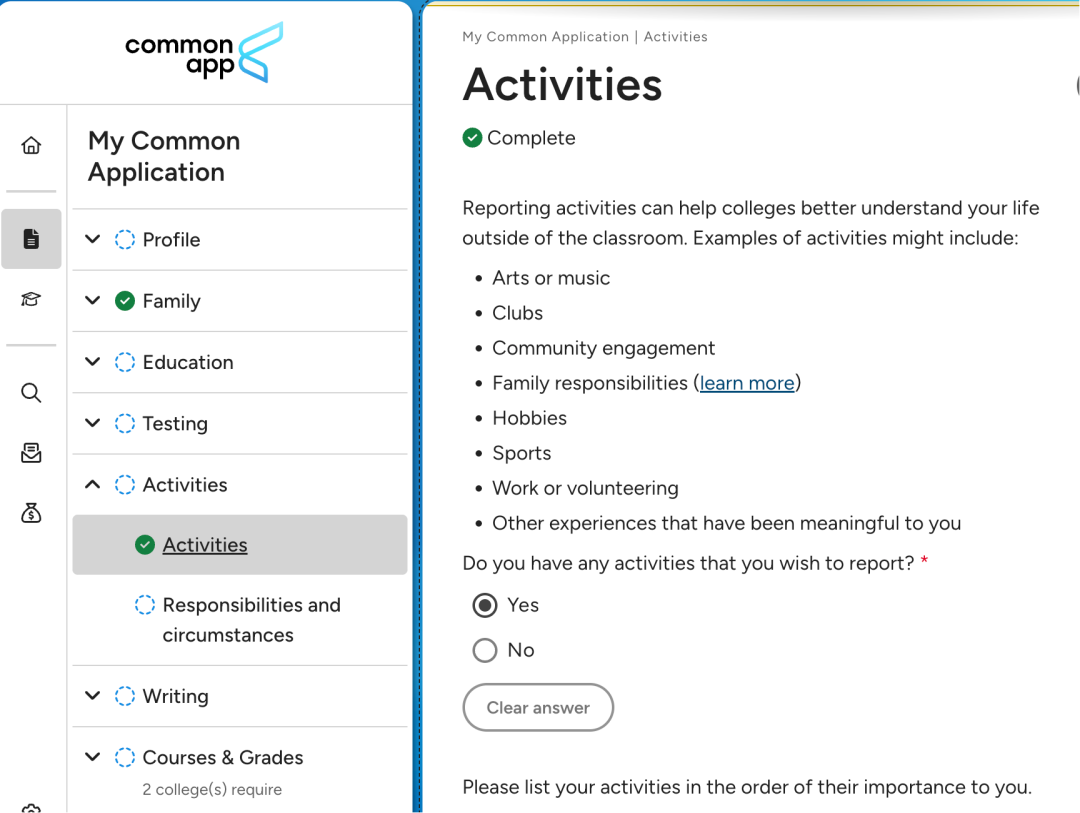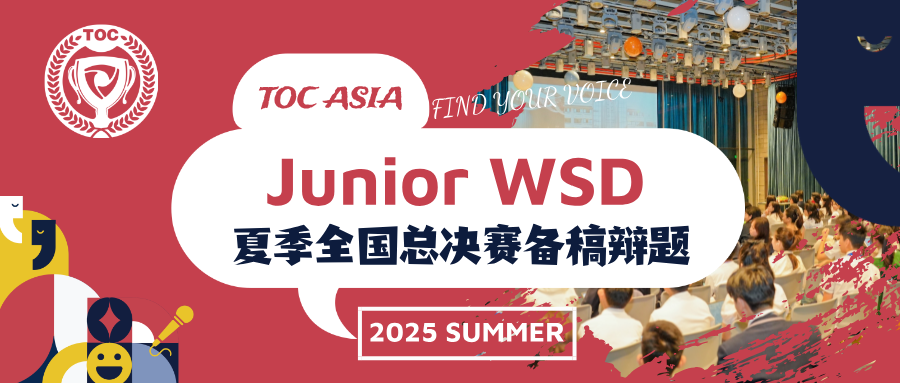
战鼓声声,思辨的荣光即将在这个夏季凝成火炬!随着近期,夏季全国总决赛公共论坛辩论辩题公布,备战Junior WSD的小选手们已然跃跃欲试。
从今年春季赛起,“TOC Junior WSD”赛制正式启用——这不仅意味着更专业的国际赛事标准全面落地,更昭示着中国少年辩手将在全球舞台上绽放更耀眼的光芒。在春季联赛的余韵犹存之际,夏季全国总决赛已吹响号角——Junior WSD备稿辩题,今日将全面揭晓!当国际化的议题碰撞年轻一代的独特视角,这场思维盛宴必将迸发新的智慧光芒。
伴随着夏季安排时间线的同步公开,这将为每一位追光少年铺就通往巅峰的阶梯。这个夏天,让我们共同见证——新生代辩手如何以语言为刃,用思考破局!
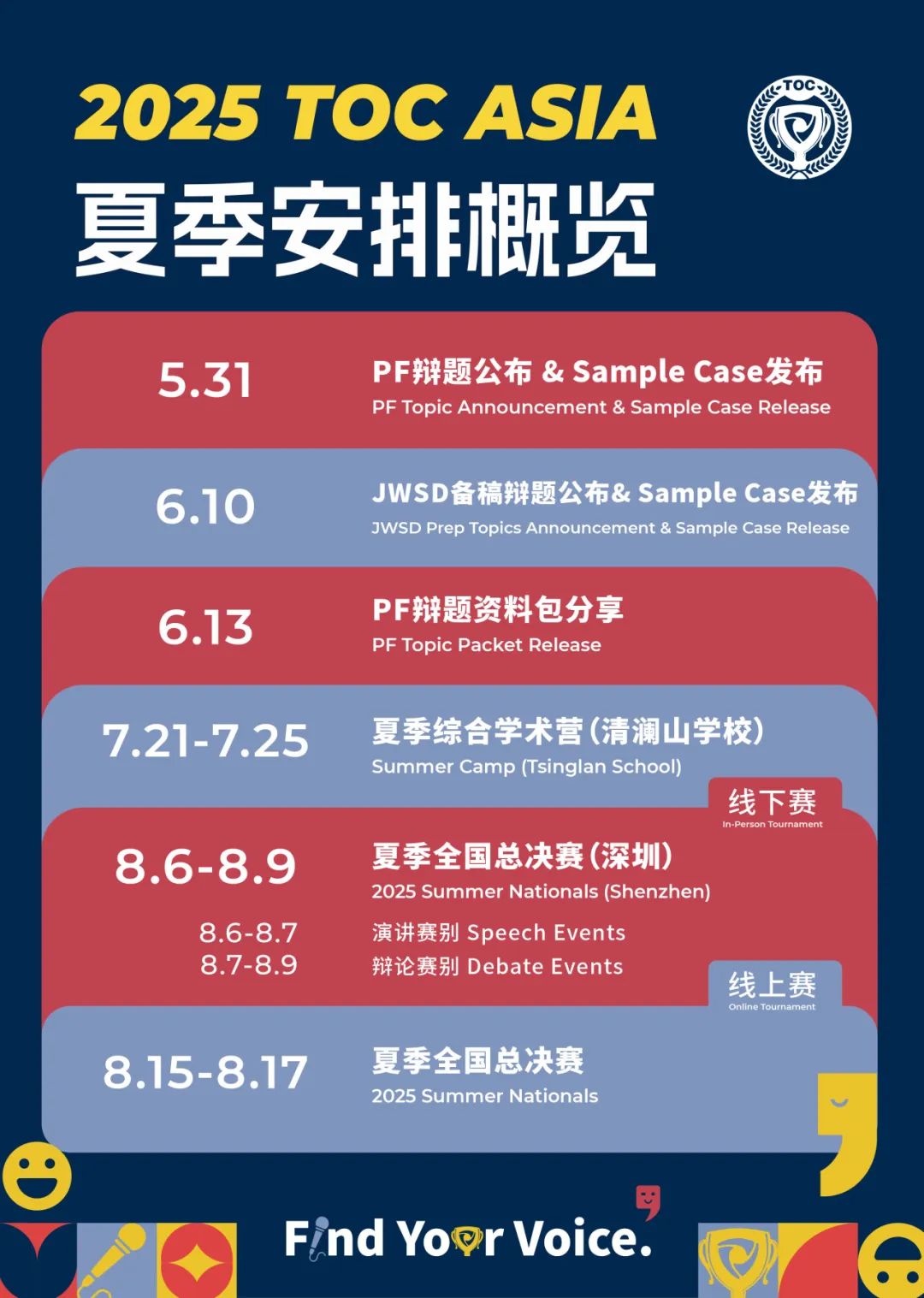
📢 辩题 & 赛程 | NOTICE
本次夏季全国总决赛Junior WSD共设 7 轮预选赛及2个备稿辩题。2 个备稿辩题将在预选赛中分别各使用 2 次。具体使用的轮次安排将于赛前一周正式公布,敬请关注!
今天,TOC ASIA学术总监
Will教练特奉上两大备稿辩题
“Sample Case”
帮助选手们快速把握辩题
打开脑洞、高效备赛
吃透辩题,勤勉以赴,方可不负期待!
备稿辩题
TOC Junior WSD
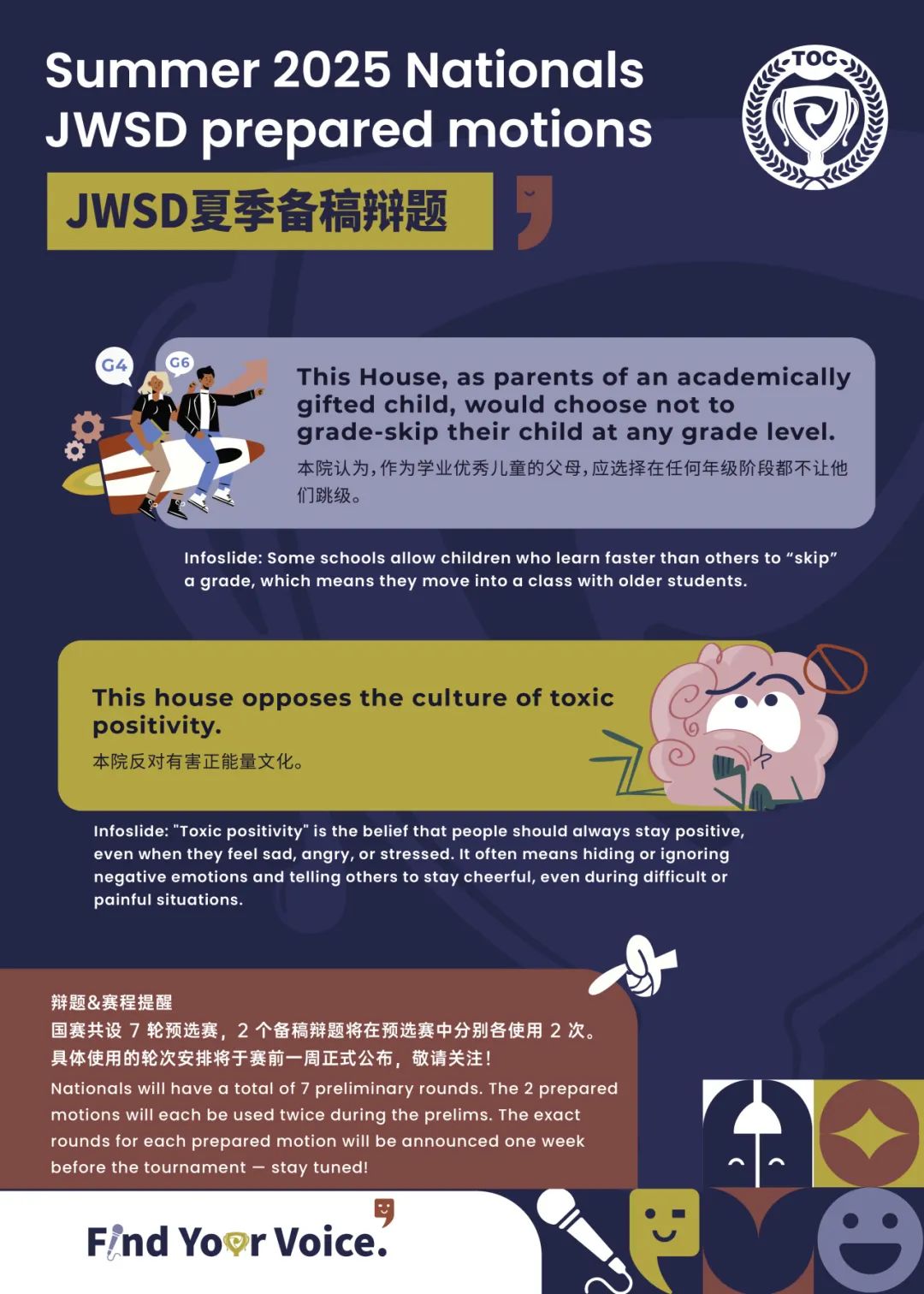
Sample Case
TOC Junior WSD
Prepared Motion 1
This House, as parents of an academically gifted child, would choose not to grade-skip their child at any grade level.
本院认为,作为学业优秀儿童的父母,应选择在任何年级阶段都不让他们跳级。
Proposition Case
Gifted students thrive most when they are supported in their current grade, not moved ahead too quickly. As parents of an academically gifted child, we would not allow our child to skip any grade level. Instead, we would work with teachers and the school to offer more challenging and personalized learning experiences within the classroom they are already in. This might include special projects, deeper-level questions during class, or working with older students in individual subjects like math or science. The goal is to challenge the child while still allowing them to grow emotionally and socially alongside their peers. We believe that skipping a grade creates more long-term problems than it solves, and that gifted students deserve support that strengthens all parts of who they are—not just their academic side.
Argument 1: Social and emotional development must come first
Just because a child is smart does not mean they are ready for the challenges that come with being in a class full of older students. A nine-year-old might be able to do a twelve-year-old’s math, but that does not mean they are ready for twelve-year-old conversations, pressures, or friendship groups. Being the youngest in the class can make students feel small or out of place. They may struggle to make friends, feel awkward during group work, or even be bullied. This kind of isolation can lead to stress, low confidence, and mental health issues. Gifted students already feel different in many ways. Skipping a grade only increases that feeling. By staying with their age group, they can build stronger friendships and learn the social skills that matter just as much in life as academic performance.
Argument 2: Deep learning is better than fast learning
Many parents think that if their child is ahead, skipping a grade will keep them from getting bored. But skipping ahead often means missing out on foundational skills in other subjects. A student may be great at reading but not yet ready for the writing assignments or group discussions that older students are expected to handle. Skipping a grade might also mean rushing through ideas that deserve more time and thought. Education should not just be about finishing early. It should be about building deep understanding, learning to think critically, and developing strong habits for the future. These goals are better achieved by offering enrichment and advanced work within the same grade, not by moving the child ahead too quickly.
Argument 3: Staying in grade builds leadership and confidence
When gifted students stay with their peers, they often become leaders in the classroom. They help other students, lead group projects, and are seen as role models. This boosts their confidence and helps them practice leadership skills, like communication and teamwork. If they skip a grade, they may go from being one of the strongest students in the class to being the youngest and most unsure. This can make them feel less confident or less willing to speak up. By staying in grade, they can grow into leadership roles that prepare them not just for academic success, but for real-life success as well. Gifted children deserve support that respects both their talents and their age.
Prepared Motion 2
This house opposes the culture of toxic positivity.
本院反对有害正能量文化。
Proposition Case
We believe that a culture which silences difficult emotions and forces fake happiness causes real harm to individuals and society. We define "opposing the culture of toxic positivity" as a societal shift in attitudes, not a government policy. This includes schools, workplaces, media, and everyday relationships. Our side supports encouraging emotional honesty rather than pressuring people to smile through serious pain or stress. We would discourage messaging like "good vibes only" or "just stay positive" when used to shut down real emotional experiences. Instead, we promote environments—like classrooms, families, and online spaces—where people are encouraged to express sadness, stress, or anger without guilt or shame. This looks like mental health education in schools, supportive listening from peers and managers, and media that shows a full range of human emotions, not just cheerful moments. We are not saying people can never try to be positive. We are saying that positivity should not come at the cost of honesty, self-expression, or healthy coping.
Argument 1: Toxic positivity harms mental health
When people are told to always “stay positive,” they begin to believe that expressing negative emotions is wrong. They may hide feelings of sadness, stress, or grief, because they fear being judged or told they are weak. This creates internal pressure, which builds over time and often leads to breakdowns, anxiety, or depression. The culture of toxic positivity teaches people that being sad is a failure, instead of a normal response to hard situations. By opposing this culture, we make it easier for people to be honest about what they’re going through and to get the support they need. Mental health improves when people are allowed to feel what they feel without guilt.
Argument 2: It prevents real connection and empathy
When someone is struggling and they hear responses like “just stay strong” or “everything happens for a reason,” it often shuts the conversation down. They are no longer being heard. This makes them feel alone, even when others are physically present. True connection comes from listening, not forcing a silver lining. When toxic positivity dominates, people are less likely to open up, and their relationships become more shallow. By opposing this culture, we make space for deeper friendships, stronger support systems, and a more honest society.
Argument 3: It creates guilt and unrealistic expectations
In a culture where everyone is expected to be cheerful all the time, people start to blame themselves when they aren’t. They feel guilty for crying, stressed about being stressed, or ashamed for not being “grateful enough.” This adds a second layer of suffering to whatever they’re already going through. Not only are they facing a hard situation, but now they also feel like failures for not smiling through it. By pushing back against this culture, we help people accept their emotions without shame and learn healthier ways to cope.
This debate is not about rejecting all optimism. It is about removing pressure to pretend. A world where people can express their real emotions without fear is more supportive, more mentally healthy, and more connected. That’s why we are proud to oppose the culture of toxic positivity.
2025 SUMMER NATIONALS
巅峰鏖战·重量级盛事·邀你来战
2025年8月6-9日
夏季全国总决赛·线下赛
2025年8月15-17日
夏季全国总决赛·线上赛
报名流程及资格审核
SUMMER NATIONALS
STEP1 填表报名
1、请参赛选手们扫码填表报名
注:请每位选手单独填写报名信息并上传相关证明文件
2、夏季全国总决赛报名截止日期
线下赛报名截止日期为 2025/7/6
线上赛报名截止日期为 2025/8/1
STEP2 资格审核
组委会将根据选手填报的信息于选手报名成功的一周内完成参赛资格审核,请注意查收邮件!
- 通过参赛资格审核的选手,将收到组委会发送的正式参赛邀请函
- 未通过参赛资格审核的选手,将收到组委会发送的通知邮件,且报名费会原路径退回至付款账户
📫TOC官方邮箱:vip@tocsd.cn
每场交锋都是蜕变的契机,每次论辩都将点燃智慧的火种。期待今夏,见证你们最耀眼的光芒!
夏季全国总决赛报名通道现已开启!


